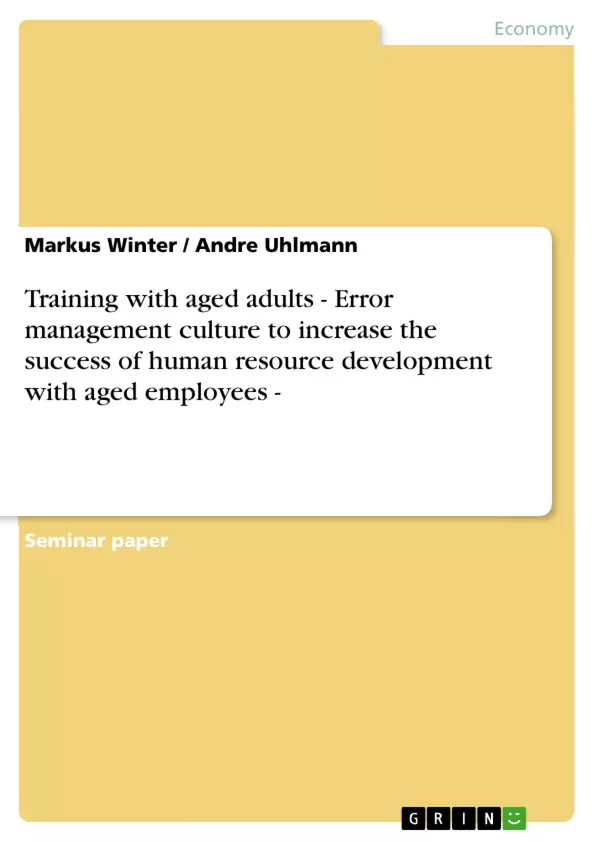Particularly today, company‟s environment is characterized by complexity and dynamic. There hardly are assured expectations but decisions within insecurity increase. That demands a lifelong learning from all social actors. The most popular form of formal learning in companies is advanced trainings. However, a look at the statistics of those trainings show that the participant rate declines with age. Faced with demographic change, the group of over 40 years old employees will increase in the future. For example, over 50 percent of employees in the United States will be over 40 by the year 2012 (Carter/Beier 2010, pp.642) - a hard challenge for effective human resource development.
The present term paper in the line with the seminar “HRM-Research” with the title “Training with aged adults - Error management culture to increase the success of human resource methods with aged employees” concentrates on error management within human resource development especially advanced training. The aim of that term paper is to show how far error management culture can increase the success of human resource development methods with aged employees. In that context success means the transfer in the work life. Based on those results, implications for human resource development practice are conveyed.
To answer this question, the following procedure was chosen. First of all it is necessary to present basic information about human resource development and error management respectively error management culture. After working out the differences between younger and older learners with the help of cognitive ability, self-regulation and motivation to learn, the empirical work of Carter and Beier with the title “The effectiveness of error management training with aged adults” is mentioned. As said above, implications based on the results of the term paper are followed then. In the end the results are summarized and a conclusion is formulated.
Inhaltsverzeichnis (Table of Contents)
- 1. Introduction
- 2. Basics of human resource development
- 3. Learning culture and error management
- 3.1 Learning culture in organisations
- 3.2 Error management in organisations
- 4. Human resource development with aged employees
- 4.1 Differences between younger and older participants
- 4.1.1 Introduction
- 4.1.2 Cognitive abilities
- 4.1.3 Self-Regulation
- 4.1.4 Motivation to learn
- 4.2 Empiricism: The study of Carter and Beier
- 4.2.1 Theory
- 4.2.2 Method
- 4.2.3 Results and Limitation
- 4.1 Differences between younger and older participants
- 5. Implications for the human resource development practice
Zielsetzung und Themenschwerpunkte (Objectives and Key Themes)
This term paper examines the role of error management culture in enhancing the success of human resource development methods, particularly advanced training, for aged employees. The paper aims to demonstrate how fostering an error management culture can improve the transfer of learned skills into the workplace for older employees.
- Human Resource Development (HRD) and its role in fostering organizational learning
- The concept of error management culture and its implications for learning
- The unique characteristics of aged employees in relation to learning and development
- The impact of error management culture on the effectiveness of HRD interventions for aged employees
- Practical implications for HRD practitioners in implementing effective training programs for older employees
Zusammenfassung der Kapitel (Chapter Summaries)
The paper begins by providing a concise overview of human resource development, highlighting its significance in enhancing organizational performance and employee capabilities. It then delves into the concept of learning culture and error management, exploring their individual and combined roles in shaping a conducive learning environment.
Subsequently, the paper focuses on the specific challenges and opportunities associated with human resource development for aged employees. It analyzes the differences between younger and older learners, considering factors such as cognitive abilities, self-regulation, and motivation to learn. To further understand the effectiveness of error management training for older employees, the empirical study conducted by Carter and Beier is examined in detail.
Schlüsselwörter (Keywords)
The main keywords and focus topics of this paper are: Human Resource Development (HRD), error management culture, aged employees, training effectiveness, learning transfer, cognitive abilities, self-regulation, motivation to learn, empirical research, and HRD practice.
Frequently Asked Questions
How does error management culture benefit aged employees?
An error management culture reduces the fear of making mistakes, which can increase the motivation to learn and the transfer of skills for older employees.
What are the main differences between younger and older learners?
Differences often lie in cognitive processing speeds, self-regulation strategies, and the specific motivations for participating in advanced training.
What is "learning transfer" in HR development?
Learning transfer refers to the successful application of knowledge and skills acquired during training to the actual tasks in the workplace.
Why is demographic change a challenge for human resource development?
As the workforce ages, companies must adapt their training methods to suit the needs of employees over 40 to maintain productivity and innovation.
What did the study by Carter and Beier reveal?
The study examined the effectiveness of error management training specifically for aged adults and its impact on their learning success.
What is an error management culture in an organization?
It is an organizational environment where errors are seen as learning opportunities rather than failures, encouraging open communication and problem-solving.
- Citar trabajo
- Markus Winter (Autor), Andre Uhlmann (Autor), 2011, Training with aged adults - Error management culture to increase the success of human resource development with aged employees - , Múnich, GRIN Verlag, https://www.grin.com/document/176015



